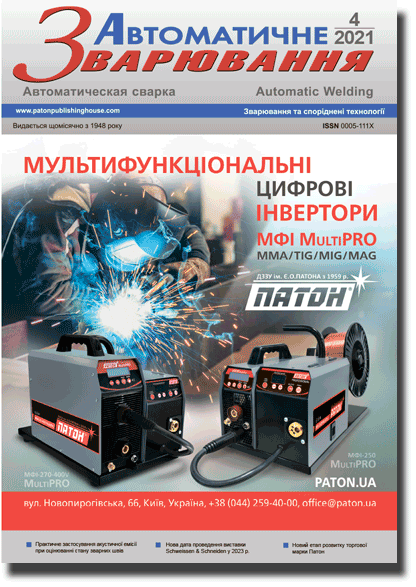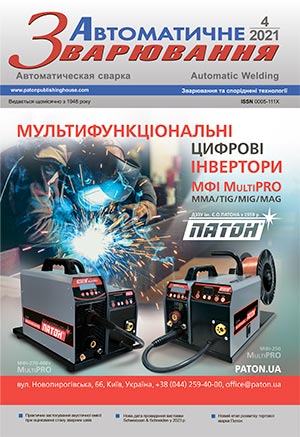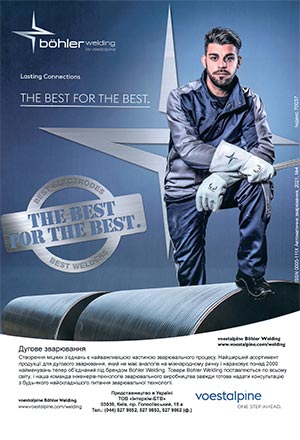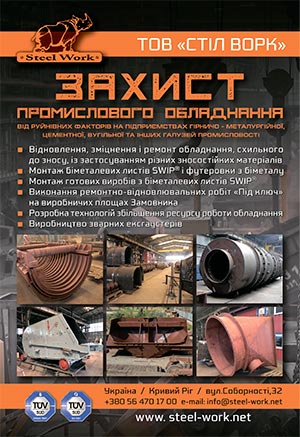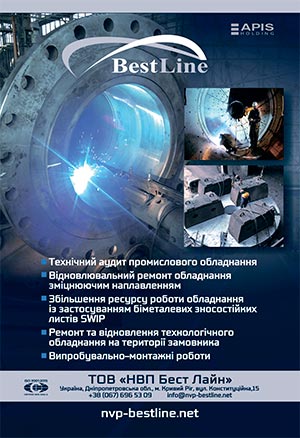| 2021 №04 (01) |
DOI of Article 10.37434/as2021.04.02 |
2021 №04 (03) |
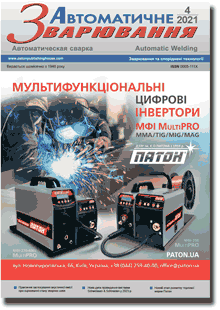
"Avtomatychne Zvaryuvannya" (Automatic Welding), #4, 2021, pp. 10-15
Use of calculation method for optimization of pulse-arc welding modes using highly alloy welding material
A.V. Zavdoveev1, V.D. Poznyakov1, O.А. Gaivoronsky1, A.M. Denysenko1, T. Baudin2
1E.O. Paton Electric Welding Institute of the NAS of Ukraine. 11 Kazymyr Malevych Str., 03150, Kyiv, Ukraine. E-mail: office@paton.kiev.ua
2Université Paris-Saclay, CNRS, Institut de chimie moléculaire et des ma tériaux d’Orsay, 91405 Orsay, France. E-mail: thierry.baudin@u-psud.fr
The use of modern pulse-arc welding technologies allows a signifi cant improvement of the quality of welded joints. However, a large number of possible welding modes hinder the development and implementation of pulse technologies in modern production. This is associated with the fact that in pulsed arc welding at least four independently variable parameters exist, which in totality requires a large number of experiments to determine their impact. To optimize the number of experiments in this study, the experimental calculation Taguchi algorithm for the process of pulsating arc welding using a highly alloy welding material was implemented. The quantitative contribution of each variable welding parameter in the formation of the penetration depth is shown. The optimal welding modes were proposed, providing a set penetration depth. 15 Ref., 6 Tabl., 4 Fig. Keywords: pulsating arc welding, penetration depth, Taguchi algorithm, highly alloy welding material
Received: 24.02.2021
References
1. Poznyakov, V.D., Zavdoveev, A.V., Gajvoronsky, O.А. et al. (2018) Effect of pulsed-arc welding modes on the change of weld metal and haz parameters of welded joints produced with Sv-08kh20N9G7T wire. The Paton Welding J., 9, 7-12. https://doi.org/10.15407/tpwj2018.09.022. Palani, P.K., Murugan, N. (2006) Selection of parameters of pulsed current gas metal arc welding. J. of Materials Processing Technology 172, 1-10. https://doi.org/10.1016/j.jmatprotec.2005.07.013
3. Tong, H., Ueyama, T. (2001) Quality and productivity improvement in aluminium alloy thin sheet welding using alternating current pulsed metal inert gas welding system. Sci. Technol. Weld. Join., 6 (4), 203-208. https://doi.org/10.1179/136217101101538776
4. Rajasekaran, S. (1999) Weld bead characteristics in pulsed GMA welding of Al-Mg alloys. Weld. J., 78(12), 397-407.
5. Zavdoveev, A., Rogante, M., Poznyakov, V. et al. (2020) Development of the PC-GMAW welding technology for TMCP steel in accordance with welding thermal cycle, welding technique, structure and properties of welded joints. Reports in Mechanical Engineering, 1, 1, 26-33. https://doi.org/10.31181/rme200101026z
6. Murray, P.E. (2002) Selecting parameters for GMAW using dimensional analysis. Weld. J., 81(7), 125-131.
7. Essers, W.G., Van Gompal. (1984) Arc control with pulsed GMA welding. Ibid, 64 (6), 26-32.
8. Ross, P.J. (1988) Taguchi techniques for quality engineering: loss function, orthogonal experiments, parameter and tolerance design. New York, McGraw-Hill, 1988 Aug.
9. Phadke, M.S. (1995) Quality engineering using robust design. Prentice Hall PTR, 1995 Dec 1.
10. Ma, Y, Hu, H, Northwood, D, Nie, X. (2007) Optimization of the electrolytic plasma oxidation processes for corrosion protection of magnesium alloy AM50 using the Taguchi method. J. Mater. Process. Technol., Feb 2, 182, 58-64. https://doi.org/10.1016/j.jmatprotec.2006.07.007
11. Wang, Y, Northwood, DO. (2008) Optimization of the polypyrrole-coating parameters for proton exchange membrane fuel cell bipolar plates using the Taguchi method. J. Power Sources, Oct 15, 185(1), 226-32. https://doi.org/10.1016/j.jpowsour.2008.07.036
12. Magudeeswaran, G, Balasubramanian, V, Reddy, GM. (2008) Effect of welding processes and consumables on high cycle fatigue life of high strength, quenched and tempered steel joints. Materials & Design., Oct 1, 29(9), 1821-7. https://doi.org/10.1016/j.matdes.2008.03.006
13. Yousefieh, M, Shamanian, M, Saatchi, A. (2011) Optimization of the pulsed current gas tungsten arc welding (PCGTAW) parameters for corrosion resistance of super duplex stainless steel (UNS S32760) welds using the Taguchi method. J. Alloys Compd., Jan 21, 509(3), 782-8. https://doi.org/10.1016/j.jallcom.2010.09.087
14. Do Kim, K, Han, DN, Kim, HT. (2004) Optimization of experimental conditions based on the Taguchi robust design for the formation of nano-sized silver particles by chemical reduction method. Chem Eng J., Nov 15, 104, 55-61. https://doi.org/10.1016/j.cej.2004.08.003
15. Yang WP, Tarng YS. (1998) Design optimization of cutting parameters for turning operations based on the Taguchi method. J. Mater. Process. Technol., Dec 1, 84, 122-129. https://doi.org/10.1016/S0924-0136(98)00079-X
Advertising in this issue:
The cost of subscription/purchase order journals or individual articles
| Journal/Currency | Annual Set | 1 issue printed |
1 issue |
one article |
| TPWJ/USD | 384 $ | 32 $ | 26 $ | 13 $ |
| TPWJ/EUR | 348 € | 29 € | 24 € | 12 € |
| TPWJ/UAH | 7200 UAH | 600 UAH | 600 UAH | 280 UAH |
| AS/UAH | 1800 UAH | 300 UAH | 300 UAH | 150 UAH |
| AS/USD | 192 $ | 32 $ | 26 $ | 13 $ |
| AS/EUR | 180 € | 30 € | 25 € | 12 € |
| SEM/UAH | 1200 UAH | 300 UAH | 300 UAH | 150 UAH |
| SEM/USD | 128 $ | 32 $ | 26 $ | 13 $ |
| SEM/EUR | 120 € | 30 € | 25 € | 12 € |
| TDNK/UAH | 1200 UAH | 300 UAH | 300 UAH | 150 UAH |
| TDNK/USD | 128 $ | 32 $ | 26 $ | 13 $ |
| TDNK/EUR | 120 € | 30 € | 25 € | 15 € |
AS = «Automatic Welding» - 6 issues per year;
TPWJ = «PATON WELDING JOURNAL» - 12 issues per year;
SEM = «Electrometallurgy Today» - 4 issues per year;
TDNK = «Technical Diagnostics and Non-Destructive Testing» - 4 issues per year.




